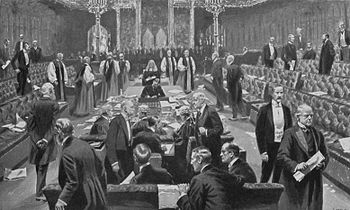Parliament Acts 1911 and 1949
The 1911 Act was a reaction to the clash between the Liberal government and the House of Lords, culminating in the so-called "People's Budget" of 1909.
The Conservatives believed that money should be raised through the introduction of tariffs on imports, which they claimed would help British industry.
Contrary to British constitutional convention, the Conservatives used their large majority in the Lords to vote down the Budget.
The Liberals made reducing the power of the Lords an important issue of the January 1910 general election.
[citation needed] The Liberals formed a minority government with the support of the Labour and Irish nationalist MPs.
However, as a result of the dispute over the Budget, the new government introduced resolutions (that would later form the Parliament Bill) to limit the power of the Lords.
[6] The Prime Minister, H. H. Asquith, asked King Edward VII to create sufficient new Liberal peers to pass the Bill if the Lords rejected it.
The King said he would not be willing to do so unless Asquith obtained a clear mandate for such sweeping change by winning a second general election.
[citation needed] The previous Liberal government's attempt to initiate Irish Home Rule had been vetoed by the House of Lords in 1893: at the time of his retirement in 1894, William Ewart Gladstone had not attracted sufficient support from his colleagues for a battle with the House of Lords.
Before giving his certificate the Speaker shall consult, if practicable, two members to be appointed from the Chairmen's Panel at the beginning of each Session by the Committee of Selection.This section originally provided that a bill to which this section applied which was rejected by the House of Lords would be presented for royal assent if it was passed by the Commons in three successive sessions, provided that two years had elapsed between second reading of the bill and its final passing in the Commons, notwithstanding that the Lords had not consented to the bill.
[19] This section provides: Nothing in this Act shall diminish or qualify the existing rights and privileges of the House of Commons.
Our object in limiting the period to five years is that there may be no risk run of the perils which have been enunciated with great vigour by right hon.
Our only object in limiting the period of the duration of Parliament is that the House of Commons shall not get out of touch with the opinion of the electorate.
[27] The House of Lords did not interfere with nationalisations in 1945 or 1946, but it was feared that the proposed nationalisation of the iron and steel industry would be a bridge too far,[28] so a bill was introduced in 1947 to reduce the time that the Lords could delay bills, from three sessions over two years to two sessions over one year.
Salisbury believed that since, in being returned to power, the Government was given a clear mandate for the policies proposed in its manifesto, it would be improper for the Lords to frustrate such legislation.
[34] After the Labour government came to power in 1997, there was repeated speculation that it would rely on the Parliament Acts to reverse a check from the Lords, but it did not prove necessary.
[35] The Hunting Bill was mentioned in the Labour Party manifesto for the 2001 general election, so, depending upon how the convention is interpreted, the attempt to block it could be taken as a breach.
[citation needed] The threat of the Parliament Acts has been employed by several British governments to force the Lords to accept its legislation.
[2] The first legal challenge to the 1949 Act is believed to have been made during the first prosecution for war crimes under the War Crimes Act 1991, R v Serafinowicz, but (according to the Court of Appeal in R (Jackson) v Attorney General) no record of the legal arguments remains.[40]: par.
[29] Support for this conclusion can be drawn from the parliamentary debates on the 1911 act, in which an entrenchment clause was considered but rejected, the government clearly displaying the intention to be able to make such amendments if necessary.
However, the 2005 decision was made on other grounds, so the question of whether the courts could refer to the 1949 Act's parliamentary debates under the principle established in Pepper v Hart was not decided.
[citation needed] In May 2011, Deputy Prime Minister Nick Clegg announced the Coalition Government's plans to legislate for a mainly elected House of Lords.


